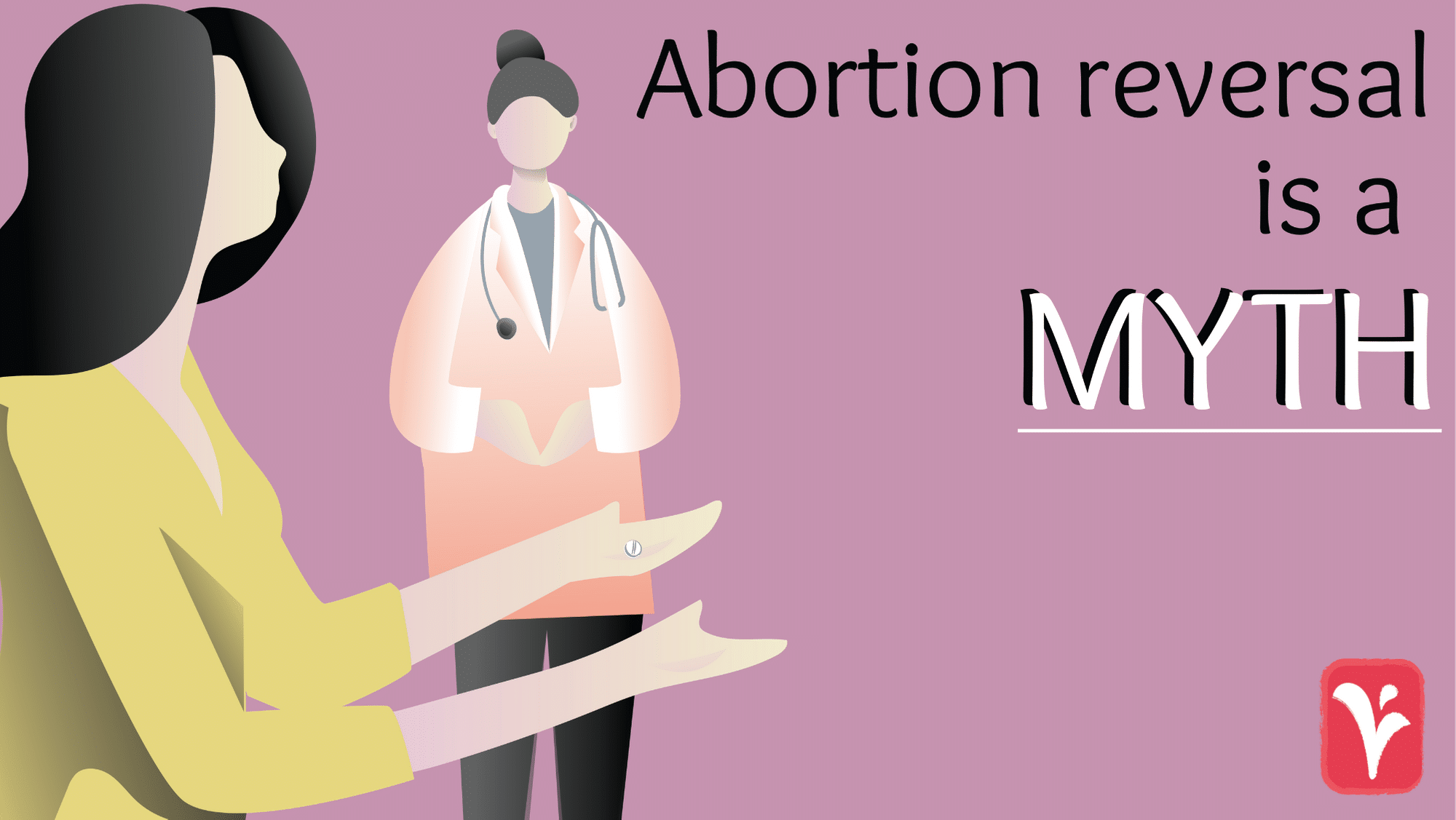It’s not unusual for an abortion to sometimes be accompanied by uncomfortable feelings. But lately, there’s been a lot of misinformation circulating as a result of lawmakers imposing unnecessary restrictions on abortion providers. Six states (Arkansas, Idaho, Kentucky, Nebraska, South Dakota, and Utah) currently require doctors to tell their patients they might be able to have an abortion reversal— and lawmakers are pushing for this in other states too. But this recent study shows seven women were admitted to the ER early on for hemorrhaging as a result of it.
At Austin Women’s Health Center, we’re not required by law to tell you this is an option, and we want you to know that reversing a medical abortion isn’t proven to be an option. In this post, we answer questions you might have if you’re wondering why reversing an abortion is a myth.
How does medical abortion work (a.k.a the abortion pill)?
Current law and FDA regulations require a medical abortion be completed in three visits: one for the ultrasound, one to take mifepristone with the doctor and receive misoprostol to take at home, and one for a follow-up to confirm the abortion was successful.

Mifepristone blocks progesterone (the pregnancy hormone), which then causes the uterine wall lining to break down, stopping the growth of the pregnancy. Misoprostol is taken 24-48 hours later, and it causes the uterus to contract in order to expel the pregnancy from your body. This is what causes bleeding and cramping.
Why isn’t an abortion reversal an option?
Some pregnancy resource centers (or crisis pregnancy centers) will advertise that they offer an “abortion reversal.” The idea was developed by an anti-abortion doctor, who believes a dose of progesterone following the first medication can successfully reverse the abortion — which the American Congress of Obstetrics and Gynecology (ACOG) said isn’t scientifically proven. But the anti-abortion doctor published his findings (in a journal that has featured other junk science), and it’s since been used by lawmakers to push their own anti-abortion agenda — even though the ACOG debunked his findings.
Additionally, there isn’t any scientific data that suggests progesterone is safe to take throughout pregnancy after an “abortion reversal”, which some are instructed to do after the initial dose of progesterone. One researcher even told Vox that the combination could cause birth defects.
What if I’m thinking about trying an abortion reversal?
As we mentioned before, we understand it’s normal for there to be uncomfortable feelings surrounding this decision. But there’s support out there, and your health is our top priority. We don’t want you to do anything that could jeopardize your well-being, and we would never recommend attempting a reversal. Instead, we recommend calling the All-Options talk line where you can connect with a counselor over the phone (and for free!) to talk about how you’re feeling. They provide support for all pregnancy options and throughout the entire process: before, during, and after. Sometimes uncomfortable feelings are hard to deal with, and talking about them with someone who understands can make things easier.
You can call All-Options at 1-888-493-0092
Hours:
Monday-Friday 10am-1am (ET) Saturday-Sunday 10am-6pm (ET)
Have you seen an advertisement for an “abortion reversal” that made it look really easy? Remember, this method was developed by someone who already didn’t support our decision, to begin with. It wasn’t developed from a place of compassion or understanding, it was designed to prevent abortions by all means necessary — even when it risks the health of the pregnant person.
How can I work through these feelings I’m having?
Even when an abortion is the right decision for you, it’s still not unusual for some to struggle with their emotions afterward. So it can be helpful to write down a list of all the reasons why you initially made your decision. It’s easy to forget when we’re caught up in a wave of emotions, and journaling is a helpful way to relieve anxiety in general.

It can also be helpful to recognize the reasons you’re wanting a reversal:
Are you experiencing pressure from your partner? Reproductive coercion is a form of abuse, and it’s important to know you don’t have to do anything you don’t want to do. This is especially true for someone pressuring you to experiment with your health and safety. Visit loveisrespect to learn more about reproductive coercion. You can speak with a trained advocate over the phone, text, or chat.
It can also be helpful to lean into your support network. If your partner can’t support you in the way you need, is there a family member or friend who you can lean on to hold space for you? You deserve time to work through these feelings without risking your health, and you deserve to be approached from a place of compassion, not fear-mongering.

Austin Women’s Health Center is here for you…
Having an abortion can sometimes bring about emotions we’re not sure how to handle — and at Austin Women’s Health Center, we won’t ever pressure you into making a decision. Most people don’t regret their abortion, but we understand that it isn’t the same for everyone. And while lawmakers shouldn’t use ‘regret’ as a reason to pass laws that require doctors to entertain the idea of abortion reversal, that’s exactly what they’re doing.
During your counseling session, you’ll have all the time you need to talk about any concerns or unresolved feelings before continuing with the abortion, should you choose to do so. We want you to feel supported when visiting with us. And if you need more time to think about it, that’s okay too! We are here for you on your terms, and we want to provide you with the compassionate care you deserve.
Feel free to reach out to us anytime and we will be happy to assist you!
